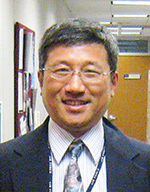Information Beyond Shannon
Date: 2023/05/19 – 2023/05/19
Academic Seminar: Information Beyond Shannon
Speaker: Jun Zhang, Professor, University of Michigan
Time: 10:00 – 11:30, May 19, 2023 (Beijing Time)
Location: CIMC Auditorium (Room 300), JI Longbin Building
Abstract
Shannon’s theory for source and channel coding (and the duality between capacity and rate-distortion) has been the hallmark for information science. Shannon information, and its associated exponential family of probability measures and the Kullback-Leibler divergence measuring the difference of any two probability densities, have found wide applications in statistical inference, machine learning, optimization, etc. Past research in Information Geometry — which is the differential geometric study of the manifold of probability models — have nicely tied together the above concepts into a geometric structure called Hessian manifold, which is dually flat with biorthogonal coordinates. In this sense, classic information theory, including KL divergence and exponential family, are well understood now as Hessian information geometry.
Given this elegant geometric picture and deep mathematical understanding, it is natural to ask whether the geometric structure can be generalized (“deformed”, technically) to more broad settings that corresponds to generalize entropies and cross entropies (for instance, that is Tsallis and Renyi). This question can be now answered positively by a series of work on deformation theory. My talk will explain this new development of information geometry (including the recently proposed lambda-deformation theory of Wong and Zhang, which unified Tsallis and Renyi deformation as the canonical deformation to Shannon’s theory).
Biography
 Jun Zhang is with the University of Michigan as a Full Professor of Psychology and of Statistics. He has held visiting positions at the University of Melbourne (Australia), CNRS Marseille (France), University of Waterloo (Canada), RIKEN Brain Science Institute (Japan), Center for Mathematical Sciences and Applications (CMSA) at Harvard University, and Shanghai Advanced Institute of Finance (China). He has served as the President, Vice President, and Executive Board Member of the Society for Mathematical Psychology, and as a member of the Council and a Member-at-Large on the Governing Board of the Federation of Associations in Brain and Behavioral Sciences (FABBS). He is a Fellow of the Association for Psychological Sciences (APS) and a Fellow of Psychonomic Society. He is the founding co-editor of the journal Information Geometry, has served as an Associate Editor of the Journal of Mathematical Psychology, and is a member of editorial boards of various journals. He directs the M3 Lab (“Mind, Machine and Mathematics”) conducting research in neuronal and brain signal analysis, computation vision, cognitive modeling, machine learning, brain-like computation and artificial intelligence. His current research effort is devoted to information geometry and geometrization of science of information.
Jun Zhang is with the University of Michigan as a Full Professor of Psychology and of Statistics. He has held visiting positions at the University of Melbourne (Australia), CNRS Marseille (France), University of Waterloo (Canada), RIKEN Brain Science Institute (Japan), Center for Mathematical Sciences and Applications (CMSA) at Harvard University, and Shanghai Advanced Institute of Finance (China). He has served as the President, Vice President, and Executive Board Member of the Society for Mathematical Psychology, and as a member of the Council and a Member-at-Large on the Governing Board of the Federation of Associations in Brain and Behavioral Sciences (FABBS). He is a Fellow of the Association for Psychological Sciences (APS) and a Fellow of Psychonomic Society. He is the founding co-editor of the journal Information Geometry, has served as an Associate Editor of the Journal of Mathematical Psychology, and is a member of editorial boards of various journals. He directs the M3 Lab (“Mind, Machine and Mathematics”) conducting research in neuronal and brain signal analysis, computation vision, cognitive modeling, machine learning, brain-like computation and artificial intelligence. His current research effort is devoted to information geometry and geometrization of science of information.
